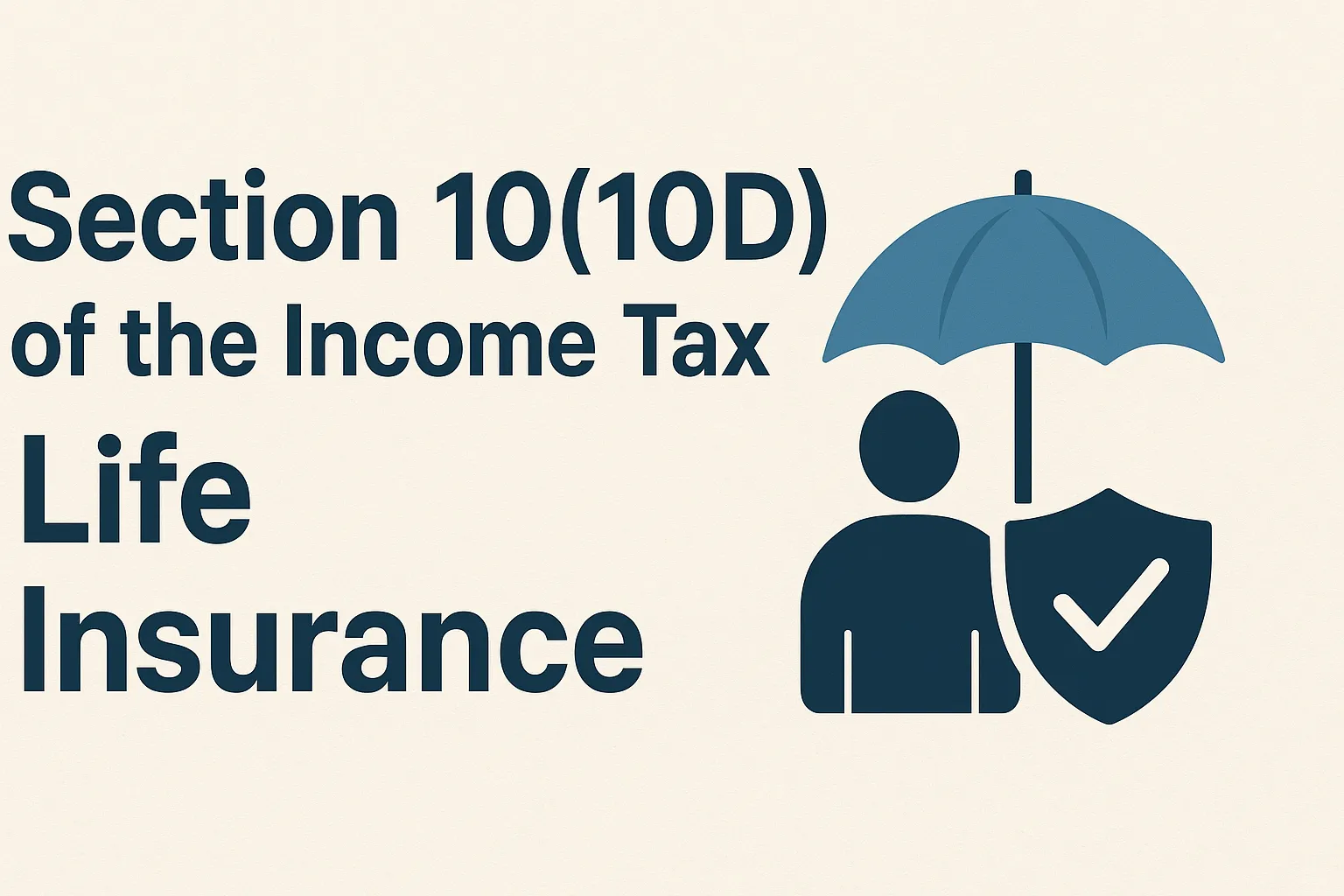Home / Life Insurance / Articles / Life Insurance General / Section 10(10D) of the Income Tax Act - Life Insurance
Section 10(10D) of the Income Tax Act - Life Insurance
Neviya LaishramNov 5, 2025
Share Post
Section 10(10D) of the Income Tax Act, 1961 is a provision under which tax exemption applies on the amount received from a life insurance policy, including maturity proceeds, survival benefits, or death benefits, subject to certain conditions.

Contents
Payouts that Qualify for Exemption Under Section 10(10D)
Tax-exempt payouts of life insurance policies include the following:
Maturity Proceeds: Amount received on completion of the policy term.
Death Benefits: Sum assured paid to the nominee upon the policyholder’s death (always tax-free).
Bonuses or Additions: Any declared bonus or loyalty addition linked to the policy proceeds.
Conditions for Tax Exemption Under Section 10(10D)
To claim tax-free benefits, the conditions to be considered consist of the following:
Policy Issue Date | Premium Limit for Exemption |
|---|---|
Policies between 1 April 2003 and 31 March 2012. | The amount of the premium on a yearly basis cannot be above 20% of the sum assured. |
Policies issued on or after 1st April 2012. | The maximum premium that one can pay annually is 10% of the sum guaranteed. |
Policies for persons with disabilities or specific diseases (Section 80U/80DDB) issued on or after 1 April 2013 | Annual premium must not exceed 15% of the sum assured. |
When the premium exceeds these limits, the maturity proceeds will be subject to tax.
Latest Amendments
In the case of ULIP Policies (Unit Linked Insurance Plans)
The maturity proceeds will not be tax-exempt if the total premium for one or more ULIPs exceeds ₹2.5 lakh in a financial year.
The death benefits of ULIPs, however, are completely tax-exempt.
For Non-ULIP Life Policies
From 1 April 2023, if the total premium for all non-ULIP life insurance policies exceeds ₹ 5 lakh in any year, maturity proceeds will not qualify for exemption.
Benefits of death do remain tax-free.
Let’s understand Section 10(10D) with a simple example
In 2016, Rahul bought a life insurance policy for 10 lakh rupees, with an annual premium of 80,000 rupees. Since ₹80,000 is 8% of ₹10 lakh (i.e., 10% below the threshold set for policies issued after April 1, 2012), the maturity amount will be tax-free as long as all the conditions are met.
Difference Between Section 80C and Section 10(10D) of the Income Tax Act
Understand how Section 80C and Section 10(10D) offer different tax benefits on life insurance. The two sections offer various tax benefits. Section 80C remits investment tax, and Section 10(10D) makes the policy payouts tax-free.
Aspect | Section 80C | Section 10(10D) |
|---|---|---|
Type of Benefit | Deduction for the premium paid | Exemption for the amount received |
Maximum Limit | ₹1.5 lakh per year | No fixed limit |
Applies To | Premium payments | Maturity, death, or surrender proceeds |
When Claimed | During the investment year | During the payout year |
Conclusion
Section 10(10D) of the Income Tax Act allows policyholders to receive tax-free benefits from their life insurance policies. It covers maturity proceeds, death benefits, and bonuses, provided the premium-to-sum assured ratio and other eligibility conditions are met.
Frequently Asked Questions
Below are some of the frequently asked questions on Section 10(10D) of the Income Tax Act
Is the amount of a life insurance maturity tax-free?
Yes, the value of maturity is not taxable in case the policy meets the conditions of Section 10(10D).
Is the death benefit always exempt from tax?
Yes, Section 10(10D) of the Income Tax Act allows death benefits to be absolutely tax-free, regardless of the premium amount.
Is section 10(10D) applicable to term insurance schemes?
Yes, the death benefit received by the nominee under a term insurance plan is tax-free under Section 10(10D).
Are ULIP returns tax-free?
ULIP returns are tax-free only if the annual premium does not exceed ₹ 2.5 lakh.
What will be the case if my life insurance policy premium is more than 5 lakh rupees?
For non-ULIP policies, maturity proceeds are taxable if the cumulative annual premium exceeds 5 lakh rupees after 1 April 2023.

Recent
Articles
Monthly Income Benefit in Life Insurance
Neviya Laishram Oct 30, 2025
Regular Income Payout from Life Insurance
Neviya Laishram Oct 30, 2025
Section 80D of the Income Tax Act - Life Insurance
Neviya Laishram Oct 30, 2025
Does Travel Insurance Cover Medical Expenses Abroad?
Team Acko Oct 28, 2025
Comprehensive vs. Basic Travel Insurance: What’s the Real Difference?
Team Acko Oct 28, 2025
All Articles
Want to post any comments?
ACKO Term Life insurance reimagined
ARN:L0072|*T&Cs Apply
Check life insurance


